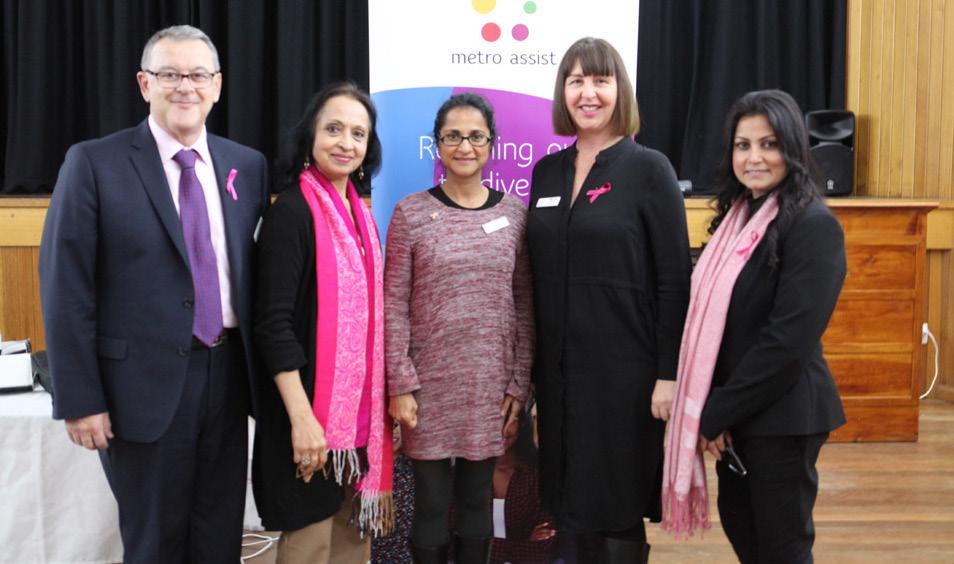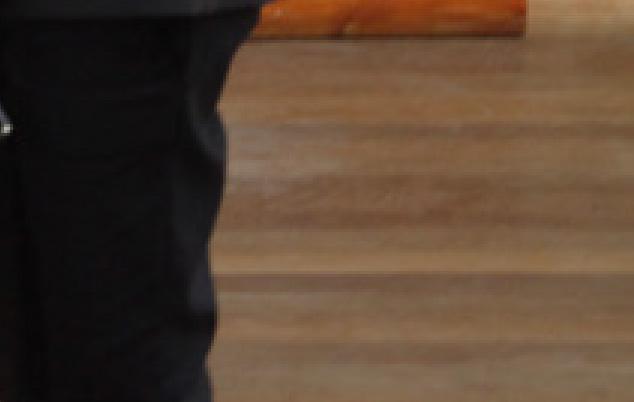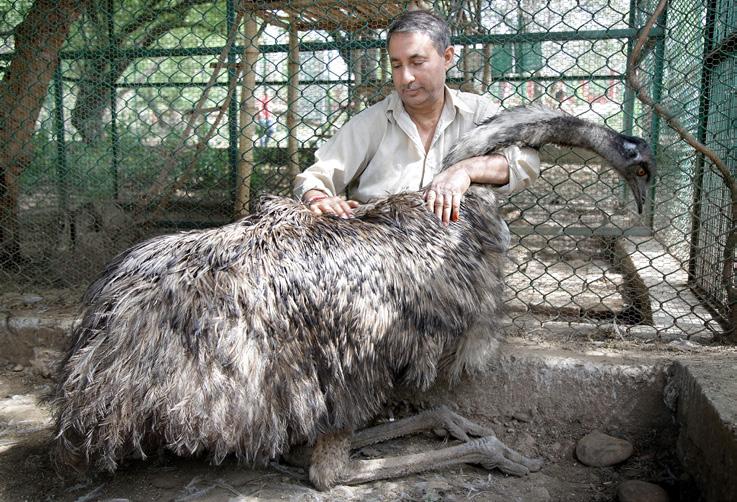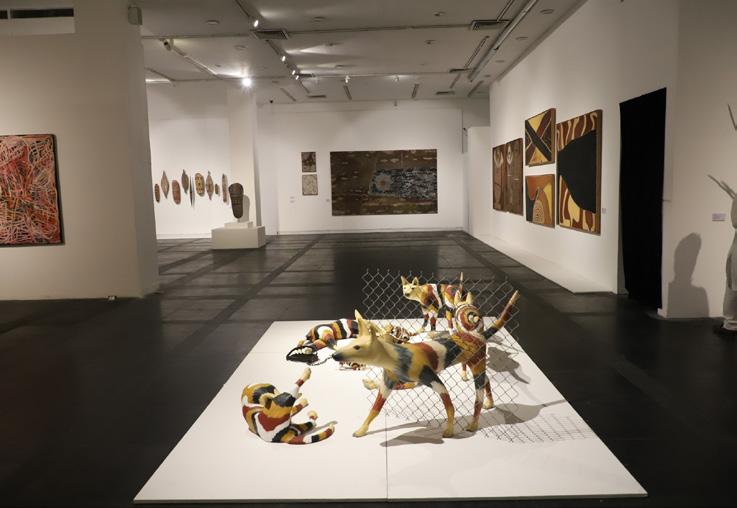
14 minute read
Let’s talk breast cancer
from 2018-06 Sydney (2)
by Indian Link
Fact: Breast cancer is the most common form of cancer diagnosed in women in NSW. Fact: As many as 1 in 8 women will have a brush with the disease in their lifetime. Fact: According to an Australian Government estimate, 2018 will see 18,087 women afflicted by breast cancer and a staggering 3,128 lose their battle against it.
The scenario begs the question: why aren’t more women talking about breast cancer? And the more important question, ‘Why aren’t more women participating in breast cancer screening?’
It was precisely these questions – and more – that were addressed at the recent Breast Screen Awareness in Migrant Communities held at the Lakemba Senior Citizen Hall, where 80 women from varied nationalities were invited.
The project, an initiative of the not-forprofit organisation Metro Assist, is funded by the Cancer Institute NSW and aims at educating Culturally And Linguistically Diverse (CALD) communities about the important of breast screening as an early detection and prevention measure.
Moushumi Martin, Breast Cancer Project Officer at Metro Assist, told Indian Link that the idea was to increase awareness on the subject through regular information sessions, excursions and discussions.
“We were thrilled to see such a healthy turnout of ladies from Indian, Pakistani, Bangladeshi, African, Indonesian, Rohingya and Chinese communities at the event,” she said.
“In some cultures, breast cancer is still considered a stigma and a taboo subject. Their presence bore testament to a progressive shift in the mindsets about the disease.”
The attendance is particularly engaging in light of a report published in 2010 by the Federation of Ethnic Communities Councils of Australia (FECCA) that said ‘Culturally and linguistically diverse communities are often under-served in the screening process, more vulnerable during the cancer treatment phase and less likely to utilise support services.’
It has also been established that the migrant women diagnosed with cancer have poorer outcomes compared to their non-migrant counterparts. The screening rate within migrant communities is much lower. This prevents the disease from being detected in early stages, resulting in lower survival rates and higher rates of reported side effects.
These dismal statistics underline the importance of educational campaigns like the one held by Metro Assist. The event, convened on 31 May, kicked off with a welcome note form Moushumi followed by an address from Metro Assist CEO Lou Bacchiella and an opening speech by Trudy Phelps, Relationship Manager at BreastScreen NSW. The program was officially launched by Bankstown Deputy Mayor Councillor Nadia Saleh, after which the Advisory Committee was introduced to the audience. The six-member committee representing various agencies consisted of Dr Zakia Hossain, from the University of Sydney, Kate Mclean, from Canterbury City Community Centre, Lie Hua from Settlement Services International, Maria Chang from Chinese Australian Services Society, and Karen Richa and Melanie Ireland from BreastScreen NSW. The event also included a session by breast cancer survivor Boshra Masri, who recounted her story of personal struggles, unwavering resilience and ultimate triumph in the wake of her breast cancer diagnoses a few years ago.
The crescendo built up by her powerful narration was maintained by the screening of a short video about Firoza Azeem and Abida Sultana, two more breast cancer survivors from CALD communities. Their stories were deeply moving and drove
9 in 10 women diagnosed with breast cancer do not have a family history home the importance of early screening in increasing the rate of survival and the quality of life afterwards.
The short film concluded the program for the evening and the ladies rounded it off with a scrumptious iftar before heading home with an improved understanding of the dogged disease, resolving to give themselves and other women in their lives the best chance to fight against it.
Breastscreen Nsw
> The BreastScreen NSW program provides free screening mammograms.
> Their mobile van will be in Lakemba till 22 June. There are also permanent of ces peppered in convenient locations all over the state.
> No doctor’s referral is needed and the appointment takes only 20 minutes.
> The images are analysed by at least two specialist doctors for accuracy of diagnosis.


> All BreastScreen NSW radiographers are females and interpreting service is available for those who need it.
> Find your nearest BreastScreen service at breastscreen.nsw.gov au or call 13 20 50 to make an appointment.
Indigenous Australian masterworks travel to India
An exhibition of over 100 artworks by Australian Aboriginal and Torres Strait Islander artists was inaugurated in Delhi’s National Gallery of Modern Art (NGMA) last week.
Indigenous Australia: Masterworks from National Gallery of Australia is a joint venture of the NGMA and The National Gallery of Australia, and features historical and contemporary works by island continent’s aboriginal people.
The works, ranging from paintings, prints and photographs to sculptures and installations, reveal a great diversity of artistic styles and their recent developments, NGMA Director General Adwaita Charan Garanayak said in a statement.
According to the exhibition’s curator Franchesca Cubilio, aboriginal art emanates from the iconography around sacred sites, ancestors and mythology. She also pointed out the “diversity in aesthetic and style” that these works have.
The contemporary art brings forth, and reveals the themes of “identity, politics, racism, and people’s connection with their land,” Cubilio added.
The masterworks, dating from late 1800s to today, include paintings on canvas, as well as tree barks using natural early pigments.
“From rare, historical drawings to the dynamic desert painting movement, to contemporary urban aboriginal art, these works are a testament to the expertise, rich cultural knowledge and ingenuity of their creators,” NGA Director Gerard Vaughan said in a statement.
Aboriginal designs, patterns and stories are reinforced and replicated through ritual, dance, song, body painting, rock engravings and paintings, and through domestic and ritual objects, he added.

The exhibition was jointly inaugurated by Australian High Commissioner to India Harinder Sidhu, India’s Culture Secretary Raghavendra Singh, NGMA Director General Garanayak, and NGA Deputy Director Kristen Paisley.
Sidhu also announced that “Australia
Fest”, aimed at showcasing Australian culture and creativity across India, would be held in September.
Google to train 8,000 Indian journalists on fact-checking
To guard journalists from falling prey to false news stories, Google India has said it will provide training to 8,000 journalists in English and six other Indian languages in the next one year.
For this, the Google News Initiative India Training Network will select 200 journalists from cities across India who will hone their skills in verification and training during five-day train-the-trainer boot camps that will be organised for English and six other Indian languages.
This network of certified trainers will then train more journalists at two-day, one-day and half-day workshops organised by the Network.
Training workshops will be conducted in English, Hindi, Tamil, Telugu, Bengali, Marathi and Kannada in cities across India.
The focus will be fact-checking, online verification and digital hygiene for journalists, using a curriculum built by experts from First Draft, Storyful, AltNews, BoomLive, Factchecker.in and DataLeads.
“Supporting trusted, authoritative media sources is a top priority for Google, which is why we are proud to collaborate with Internews, DataLeads and BoomLive to support journalists in their fight against misinformation in India,” said Irene Jay Liu, Google News Lab Lead, Asia-Pacific.
“Our goal is to train more than 200 trainers, who will then train 8,000 journalists in six languages over the next year, making this Google’s largest training network in the world,” Liu added.
UNESCO condemns Indian newspaper editor’s murder
UNESCO chief Audrey Azoulay has condemned the slaying of prominent journalist and newspaper editor Shujaat Bukhari and his two police bodyguards in Indian-administered Kashmir last week.
“I condemn the murder of Shujaat Bukhari and his bodyguards,” said Azoulay, the
Director-General of United Nations culture organisation.
“I trust the authorities will spare no effort in seeking and prosecuting the killers who were undeterred by the presence of police in their determination to silence a journalist known as a voice of moderation.”
Bukhari, editor of the Rising Kashmir newspaper, was shot by unidentified gunmen as he was leaving his office in Srinagar on 14 June. The two police guards escorting him were also killed in the attack. Bukhari had been under police protection since an earlier attack in 2000.
Kashmir is at the centre of a decadesold territorial dispute between India and Pakistan. Both countries claim Kashmir in its entirety and control different parts of it.
India has also been battling armed militant groups who are fighting against New Delhi’s rule in Kashmir. The conflict has killed tens of thousands of people over the years.
Bukhari lobbied for peace in Kashmir in by organising conferences and summits in the US, Britain and other parts of the world. The killing occurred on the eve of Eid. The Editors Guild of India called it a “grave attack on press freedom and democratic voices”. Major English publications including Greater Kashmir, Kashmir Reader, Kashmir Observer and Bukhari’s own Rising Kashmir came out with blank editorials to condemn the murder. Urdu newspaper Daily Tamleel Irshad did the same.
Girl from rural Punjab tops AIIMS entrance
Eliza Bansal, 17, from Punjab’s backward area of Lehragaga in Sangrur district has topped in the entrance examination for the prestigious All India Institute of Medical Sciences (AIIMS), New Delhi.
Eliza scored 100 percentile marks in the entrance for the Bachelor of Medicine and Bachelor of Surgery (MBBS) course at AIIMS. Lehragaga, a municipal town in Punjab’s Sangrur district, around 165 km from Delhi, itself lacks proper medical facilities and doctors.
Eliza, whose father Vijay Kumar is an
Economics teacher in a government school and whose mother is a homemaker, was a student of the DAV Senior Secondary Public School in Lehragaga. She said that she always wanted to become a doctor and wants to improve medical facilities in her area.
Goa-Hawaii to be sister states
Goa and Hawaii will soon sign a memorandum of understanding making them sister states, Goa Chief Minister Manohar Parrikar said recently.
“Goa is going to sign a sister state agreement. The Cabinet has given approval. The process started when I was Defence Minister. (Hawaiian) Congresswoman Tulsi Gabbard has a keen interest in Indian culture. She moved a proposal and the Governor supported it,” Parrikar said.
Gabbard is the first Samoan American and the first Hindu member of the US Congress. Parrikar said that during his visit to Hawaii as Defence Minister, he witnessed several similarities shared by the tropical US state and Goa.
“I have been there for three days to visit Pacific command as Defence minister. I was surprised to see that it looks exactly like Goa.”
“Their food habits are also like us – fish, rice and coconut is abundant. It looks like Goa, the two have a lot of similarities and they are interested in having sister-state relationship... Once we sign it, we will formulate a programme and accordingly we will work on it,” the Goa CM said, adding that the relationship could cover exchanges in the fields of culture, education and tourism.
Hyderabad mosque opens doors to non-Muslims
Standing on a balcony, a group of nonMuslims including women watched Muslims offer prayers at a mosque in Hyderabad which formally opened its doors for people of all faiths.
It was an opportunity for followers of different religions to know how a mosque looks from the inside and how Muslims offer ‘namaz’
Visitors including heritage activist P. Anuradha Reddy went around Masjid-eQuba to see the charts displayed by the organisers explaining basic tenets of Islam. She said such programmes promote better understanding between communities.
The organising committee of the mosque located in Mehdipatnam area, organised the first-ever “open mosque” programme inviting people of other faiths to visit the place of worship in an effort to elucidate the teachings of Islam.
A large number of Hindus, Christians and Sikhs visited the mosque and were explained concepts of ‘namaz’, ‘aazaan’ (call for prayers) and ‘wazu’ (ablution). They were also explained why the architectures of most of the mosques include minarets and domes. They were then treated to dates and sheer khurma, a sweet made with vermicelli, milk and dry fruits.
Facebook bats for digital literacy for women
Facebook recently announced its partnership with the National Commission for Women
(NCW) to conduct a digital literacy programme aimed at training women scholars in Panjab University.
“We are committed to equipping women to express themselves freely. That’s why we invested through our products, policies and community education programmes to create a safe space for women to communicate and share,” said Ankhi Das, Public Policy Director-India, South and Central AsiaFacebook.
Launched in collaboration with Cyber Peace Foundation, the programme will enable women scholars to learn using online resources, protect themselves and promote digital literacy to reap the benefits of the internet.
The social media giant entered into a partnership with NCW last month and launched a digital literacy programme to train 60,000 women in universities across the country on the safe use of the internet, social media and email.
108 migrants from Pakistan get Indian citizenship
A total of 108 migrants from Pakistan received Indian citizenship in Rajasthan this month. Jodhpur District collector Ravi Kumar Surpur distributed the citizenship certificates to the former Pakistanis. Most of these migrant-turned-Indian citizens got teary-eyed when they received the certificates. The surroundings of the Town Hall where they were given the certificates echoed with slogans such as Bharat mata ki jai!
Hindu Singh Soda, President of Seemant Lok Sangathan who has played an active role in highlighting the plight of the migrants, said directions to give them citizenship were issued way back in December 2016, and that some 6,000 people were still awaiting Indian citizenship.
Now, Shimla-Chandigarh heli-taxi to ply thrice a week
The heli-taxi service between Shimla and Chandigarh will now ply thrice a week, Chief Minister Jai Ram Thakur said recently.
“Seeing the response of the tourists, we have decided to ply the heli-taxi service on every alternate day in a week – Monday, Wednesday and Friday,” Thakur told reporters.
With the launch of the heli-taxi service, the travel time between Shimla and Chandigarh is reduced to just 20 minutes. The state government in association with helicopter service operator Pawan Hans Ltd launched this service, cutting down the earlier four hours’ travel time. Each sortie, with 18 passengers on board, offers a minimum fare of Rs 2,999 per person.
New GM CFO, Dhivya was a ‘focused student’
The schoolmates of Dhivya Suryadevara, who has been appointed Chief Financial Officer (CFO) of US automotive company General Motors, describe her as a calm and focused student who had all the fun.
“Dhivya was very disciplined and focused. She never neglected her studies. And yet, she managed to have fun,” said Subha Srinivasan, a teacher in a Bengaluru school.
In a historic move of sorts, GM appointed Dhivya as the new CFO of the company reporting to Mary Barra, Chairman and CEO. Her classmates at St. John’s Senior Secondary School revealed that she was generally a quiet girl who excelled at studies.
“She was brilliant and hard working. She had no airs about being one of the class toppers. Generally her batch-mates were good and many of them are in good positions,” said S. Raja Ponnivelan, who taught accountancy at the school.
Indian Railways set for a makeover
The dark blue coaches of Indian Railways will be a thing of the past now as the public transporter would be repainting all Mail/ Express trains in a new colour schemebeige and brown.
The freshly-painted Delhi-Pathankot Express with 16 coaches will be the first train to be rolled out, by this month-end, with the new colour scheme developed by the in-house team of Northern Railway.
The colour of premium trains - including Rajdhani, Shatabdi and Duronto - will however not be changed and only Mail/ Express service with conventional coaches manufactured at the Integral Coach Factory in Chennai will be donning the new hues. Special service trains like Tejas and Gatimaan Express will also continue with the existing colour.
“A complete makeover of coaches was long overdue and the new colour scheme was applied in trains after it was finally approved by Railways Minister Piyush Goyal,” a senior Railways Ministry official said.
It was in the 1990s that the new colour scheme of dark blue was introduced for Mail/ Express coaches, replacing the brick red colour which was in use for decades.
Now, the Railways has quite a task at hand - repainting about 30,000 coaches. “The change of colour is part of the Railways’ efforts to make passengers’ experience a pleasant one,” the official added.
Not only that, steps have been taken to improve the interiors of the coaches with additional facilities. “The replacement of all toilets with bio-toilets, providing mobile chargers at each berth, and comfortable seats are some of the changes undertaken in trains. In fact, a provision has also been activated to solicit passengers’ response and suggestions for improving service,” he added.
Flavours of India at FIFA World Cup 2018
Restaurateurs Prodyut and Sumana Mukherjee have not only brought Indian flavours to the ongoing World Cup in Russia but also plan to dish out free dinner to countrymen if Argentina wins the trophy on July 15.
Based in Moscow for the last 27 years, Prodyut and Sumana run two Indian eateries, Talk Of The Town and Fusion Plaza. Both restaurants serve popular Indian dishes like butter chicken, kebabs and a varied vegetarian spread.
During the World Cup, they are offering a 25 per cent discount for those who will possess a Fan ID (required to watch World Cup games). There will also be gifts and contests on offers during matches in both the restaurants to celebrate the event.
The Mukherjees, hailing from Kolkata, are diehard fans of Argentina. “I am an Argentina fan. I have booked tickets for a quarterfinal match, a semifinal and of course the final. If Argentina goes on to lift the trophy, I will invite all Indians who have come here to watch the World Cup for a free dinner at both my restaurants,” Prodyut said.
“We have been waiting for this World Cup. Indians come in large numbers during the World Cup and we wanted these eateries to be a melting pot,” he added.
According to Cutting Edge Events, FIFA’s official sales agency in India for the 2018 World Cup, India is amongst the top 10 countries in terms of number of match tickets bought.
“After Russia won the first match of the World Cup, the footfall has gone up considerably. Indians are also flooding in after the 6-9 pm game. That is the time both my restaurants remain full,” Prodyut said.
There are also plans to rope in registered fan clubs of Latin American countries, who will throng the restaurants during matches and then follow it up with after-game parties till the wee hours.
Watching the World Cup is a dream come true for the couple, Sumana said. “We want to make sure the Indians who have come here to witness the spectacle feel at home too. We always extend a helping hand and since we are Bengalis, we make special dishes for those who come from Bengal,” she added.
Sulabh founder wins Japan’s Nikkei Asia Prize

Social worker Bindeshwar Pathak, the man behind the low-cost toilet revolution Sulabh Sauchalya, was recently honoured with Japan’s prestigious Nikkei Asia Prize for his contribution towards culture and community.
Pathak, the founder of Sulabh International, received the award for the invention of two-pit pour-flush ecological compost toilets that help provide low-cost environment friendly toilets to millions in the developing world. While accepting the award, Pathak dedicated it to the downtrodden sections in the society.
“This award will be another milestone in my commitment to the service of the society in Asia in particular and world in general,” Pathak said.
The award was presented by Naotoshi Okada, President of Nikkei Inc. Former Prime Minister Manmohan Singh and Infosys co-founder Narayana Murthy are among the few Indians who have won this coveted prize in the past.
While conferring the award, the Chairman of the Award Committee Fujio Mitarai said Pathak was being bestowed the honour for “tackling two of his country’s biggest challenges - poor hygiene and discrimination”.
The other two winners of the award are Ma Jun (Economic and Business Innovation), a Chinese environmentalist, for using the power of the Internet to promote cleaner industry, and Nguyen Thanh Liem (Science and Technology), a Vietnamese doctor, for bringing cutting-edge medicine to children.
The Nikkei Asia Prizes were created in 1996 to commemorate the 120th anniversary of Nikkei Inc’s main Japanese-language newspaper. IANS










